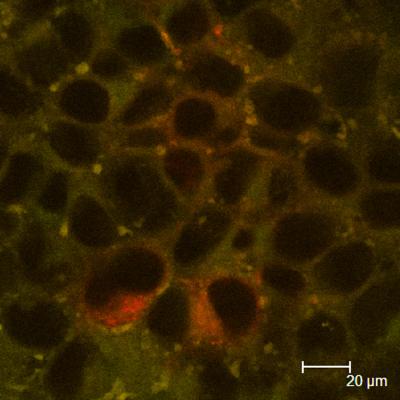According to a research study conducted by a team of scientists from Binghamton University and Cornell University, nanoparticles may affect long-term health of human beings even in low dosages.
 This figure shows 50 nm carboxylated polystyrene nanoparticles (green) interacting with a cell culture model of the intestinal epithelium (red). Oral exposure to these particles was shown to affect iron transport. (Credit: Nature Nanotechnology)
This figure shows 50 nm carboxylated polystyrene nanoparticles (green) interacting with a cell culture model of the intestinal epithelium (red). Oral exposure to these particles was shown to affect iron transport. (Credit: Nature Nanotechnology)
The research team wanted to study the impact on people when they get continuous exposure to the nanoparticles in miniscule dosages as in the case of a drug or supplement containing some form of nanoparticles.
Gretchen Mahler, one of the researchers, explained that the team conducted the study in two ways. One method was in vitro via human intestinal-lining cells cultured by the team in the laboratory and the second method was in vivo via a live chicken’s intestinal linings. Both set of results showed that nutrient absorption into the bloodstream was influenced by the nanoparticle exposure.
The research team studied the uptake of iron using polystyrene nanoparticles due to their easily traceable fluorescent properties. Mahler informed that iron absorption decreased by nearly 50% for brief exposure to nanoparticles. However, the team witnessed a 200% increase in absorption when it extended the exposure time, clearly indicating the impact of nanoparticles on iron uptake and transport.
Acute oral exposure to nanoparticles affected the intestinal iron transportation, while chronic exposure remodeled the intestinal villi, which are finger-like projections necessary for nutrient absorption, causing faster entry of iron into the bloodstream. The research team’s next step is to study the possibility of similar changes in nutrient absorption in other inorganic minerals like zinc, copper and calcium and the reaction of nutrients like fat-soluble vitamins K, E, D and A.
The research team believes that its work, especially the in vitro model can be used as an efficient inexpensive screening tool to study the toxicity of nanoparticles and the potential reactivity of human tissues.
The study results have been reported in Nature Nanotechnology.